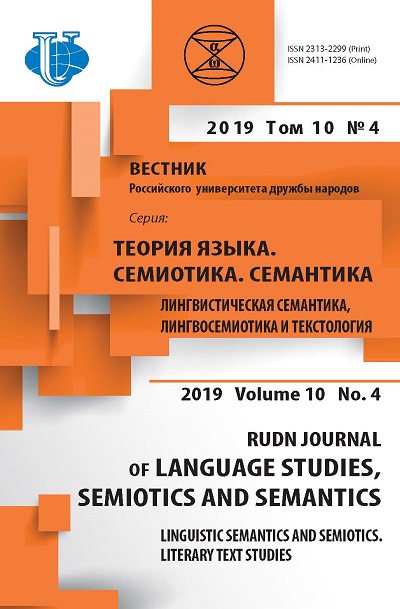Метафорический потенциал сленгового языка молодежи: некоторые результаты пилотного эксперимента
- Авторы: Диланова Э.А.1
-
Учреждения:
- Курский государственный университет, Курск, Российская Федерация
- Выпуск: Том 10, № 4 (2019): Лингвистическая семантика, лингвосемиотика и текстология
- Страницы: 871-878
- Раздел: ФУНКЦИОНАЛЬНАЯ СЕМАНТИКА
- URL: https://journal-vniispk.ru/2313-2299/article/view/341068
- DOI: https://doi.org/10.22363/2313-2299-2019-10-4-871-878
- ID: 341068
Цитировать
Полный текст
Аннотация
Данная статья посвящена исследованию сленгового языка молодежи на материале результатов пилотажного свободного ассоциативного эксперимента. Цель данного исследования - выявить, какое содержание вкладывают носители того или иного языка в стереотипные для них понятия, и раскрыть связи, существующие в концептуальной системе носителей языка. В связи с этим был проведен пилотажный ассоциативный эксперимент среди 40 испытуемых - носителей английского языка или владеющих им на уровне родного, относящихся к молодежи. Также были представлены результаты проведения свободного ассоциативного эксперимента, нацеленного на выявление компонентов, отражающих национальные и индивидуальные особенности восприятия сленгизмов, а также метафорические характеристики наивного дискурса, являющиеся универсальными для представителей молодежи. Кроме того, нам удалось выявить влияние экстралингвистических факторов на устройство ассоциативного тезауруса.
Ключевые слова
Об авторах
Э. А. Диланова
Курский государственный университет, Курск, Российская Федерация
Автор, ответственный за переписку.
Email: urban044@mail.ru
улица Радищева, 33 Курск, Российская Федерация, 305000
Список литературы
- Beregovskaya, E.M. (1996). Youth slang: formation and functioning, Questions of linguistics, 3, 32—41. (In Russ.).
- Polivanov, E.D. (1931). Marxist linguistics. Moscow: Federation, 1931. (In Russ.).
- Thorne T. (2005). Dictionary of Contemporary Slang — A & C Black Publishers Ltd.
- Kryuchkova, N.V. (2005). Linguocultural variation of concepts. Saratov: Nauchnaja kniga. (In Russ.).
- Karaulov, Yu.N. (1994). Russian associative dictionary as a new linguistic source and tool for the analysis of language ability // Russian Associative Dictionary. Moscow: Pomovsky and partners, 1994. Book 1: Direct vocabulary: from stimulus to reaction. Associative thesaurus of modern Russian language. Part 1. (In Russ.).
- Leontiev, A.A. (1969). Vocabulary of stereotypical associations of the Russian language, its theoretical foundations, tasks and importance for teaching the Russian language to foreigners In Questions of educational lexicography. Moscow. pp. 114—128. (In Russ.).
- Zalevskaya, A.A. (1987). Some ways to study the psychological structure of the meaning of keywords in order to optimize inter-ethnic communication In Translation and automatic text processing. Moscow. pp. 46—58. (In Russ.).
- Tarasov, E.F. (2004). Linguistic consciousness, Questions of psycholinguistics, 2, 34—47. (In Russ.).
- Orlova, V.V. Social maturity of youth: the socio-psychological aspect In Youth in the social structure of Russian society URL: http://econf.rae.ru/article/4479 (accessed: 05/09/2018). (In Russ.).
- Zubkova, O.S. (2014). Terminological derivation of professional metaphor: linguosemiotic aspect, News of South-West State University. Scientific peer-reviewed journal. Series: Linguistics and Pedagogy, 2, 32—36.
- Latysheva, V.L. (2010). National precedent phenomena as elements of the associative thesaurus of Russian and French (according to experimental research), Bulletin of the Irkutsk State Linguistic University, 4 (12), 110—118.
- Zubkova, O.S. (2006). The specifics of the functioning of the metaphor in the individual lexicon [dissertation]. Kursk.
- URL: https://www.urbandictionary.com (accessed: 05/09/2018).
- Zubkova, O.S. (2013). The specifics of the objectification of meaningful practices in the framework of an integrated linguosemiotic space, Theory of language and intercultural communication. Science Magazine, 1 (13) [Electronic resource] URL: http://tl-ic.kursksu.ru/pdf/013-005.pdf (accessed: 05/09/2018).
- Zubkova, O.S. (2010). Medical metaphor-term as mental representation, Questions of cognitive linguistics. Scientific and theoretical journal, 3, 41—48.
Дополнительные файлы








